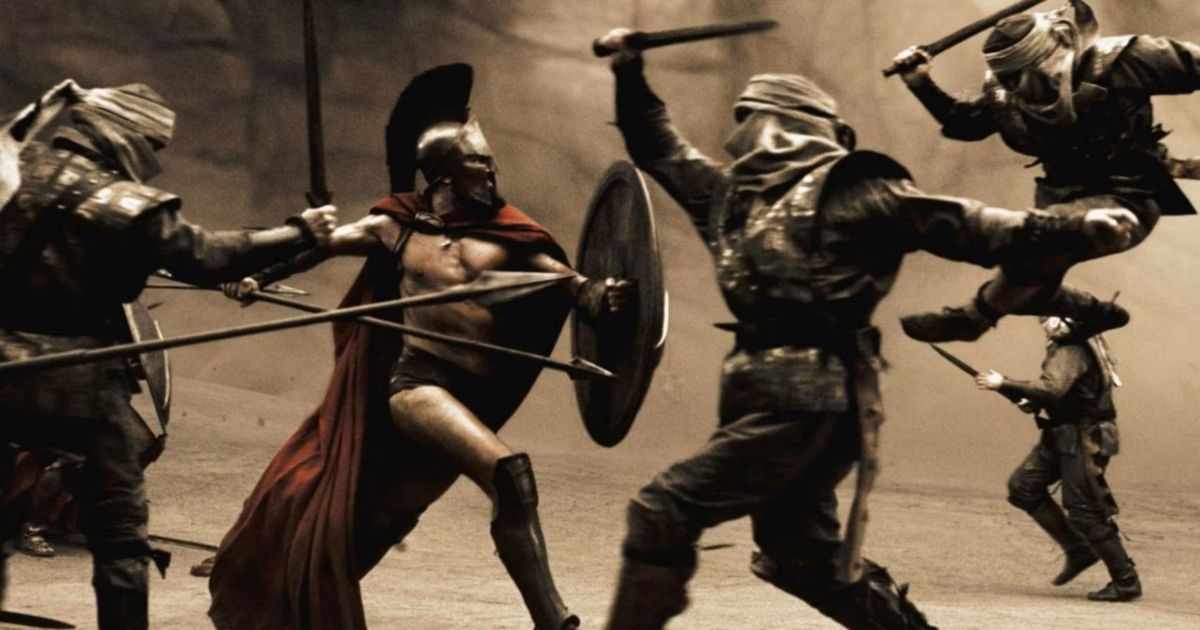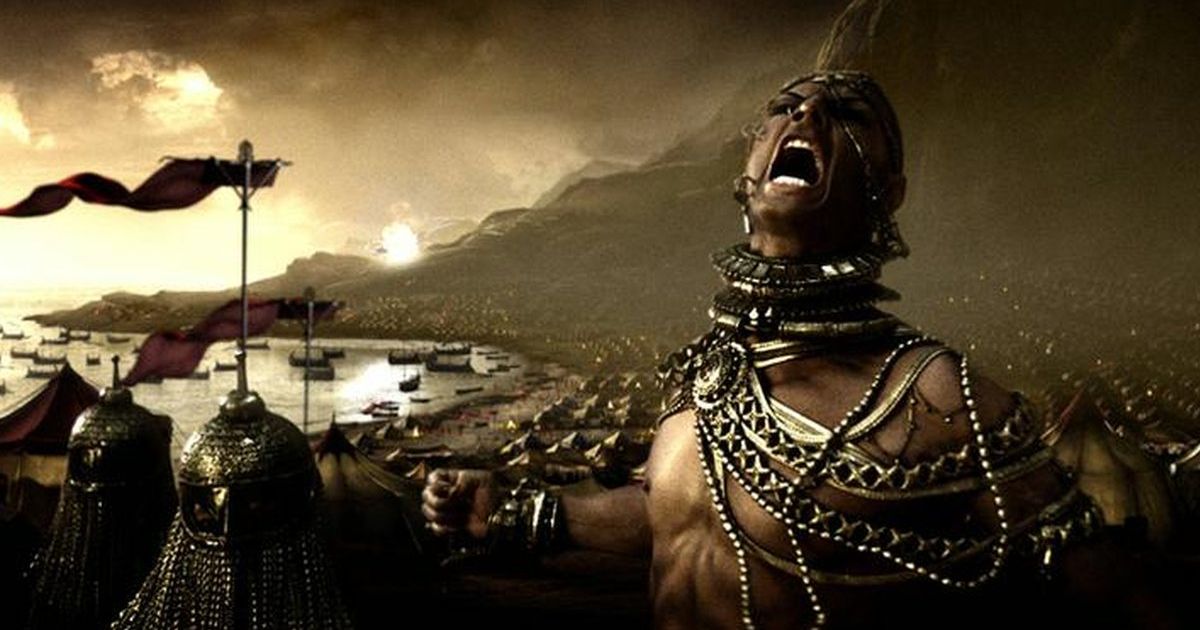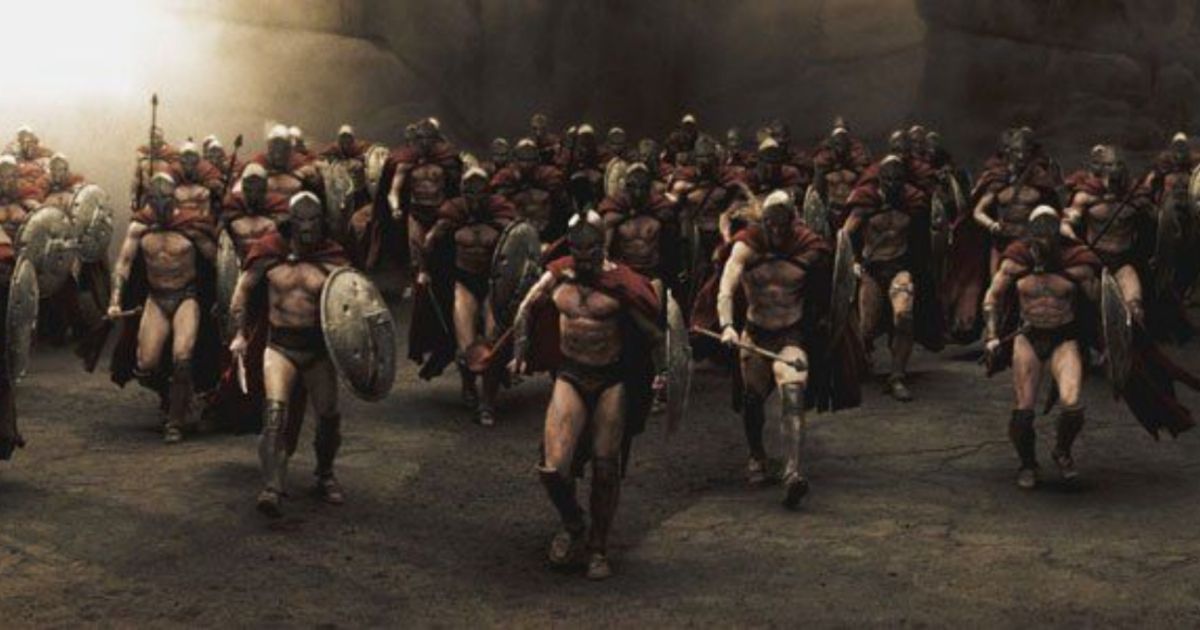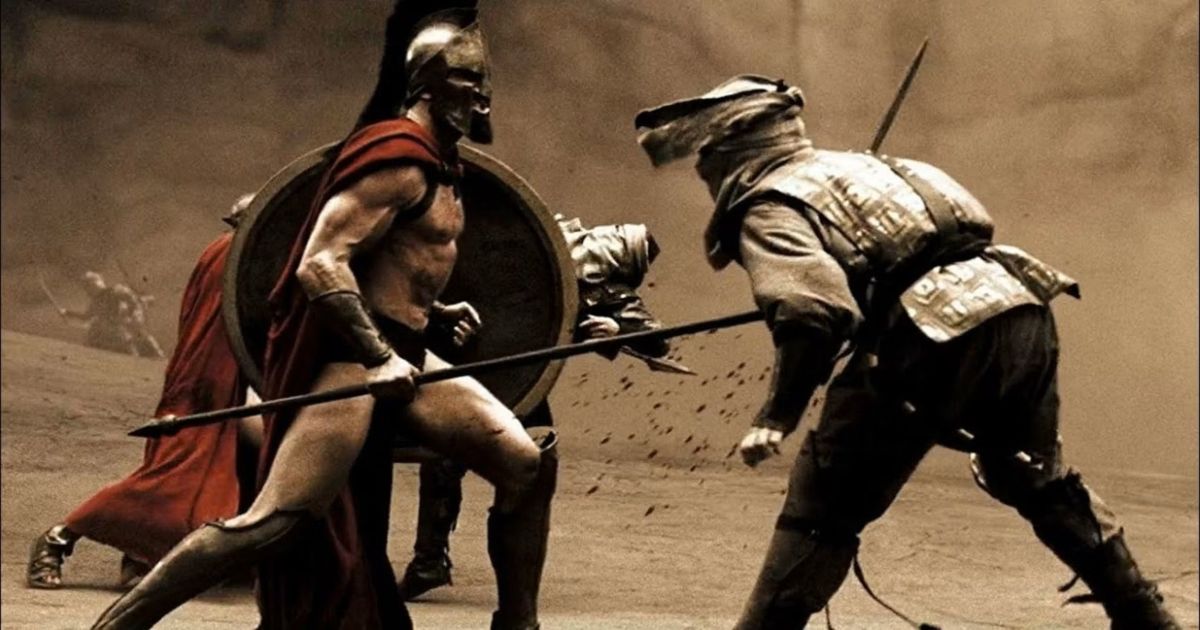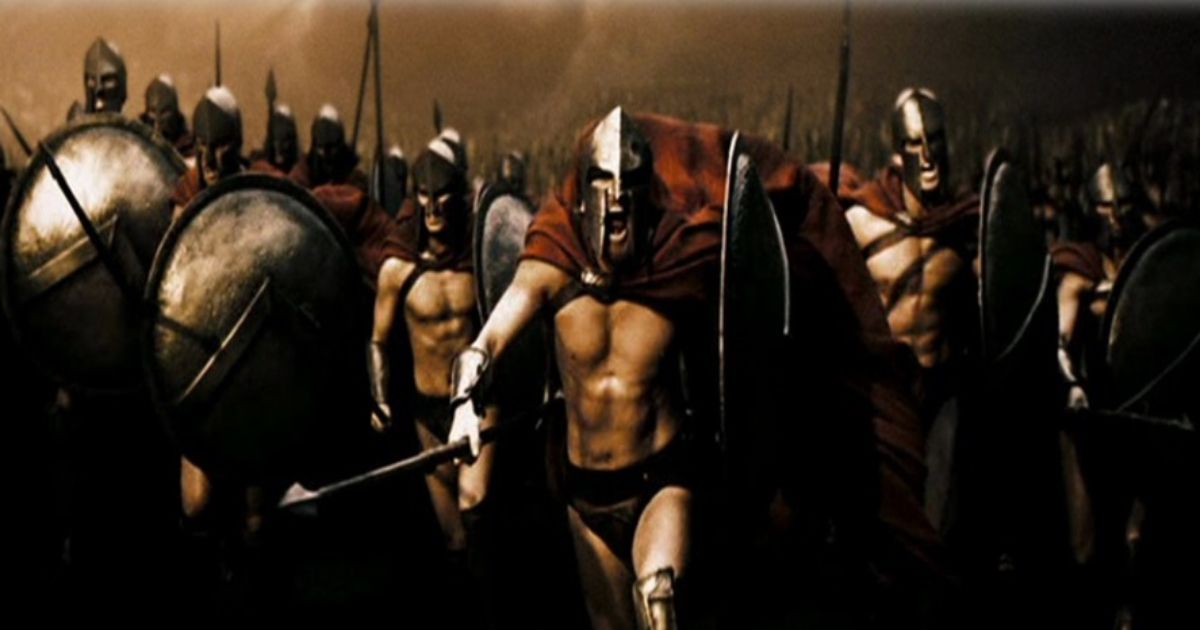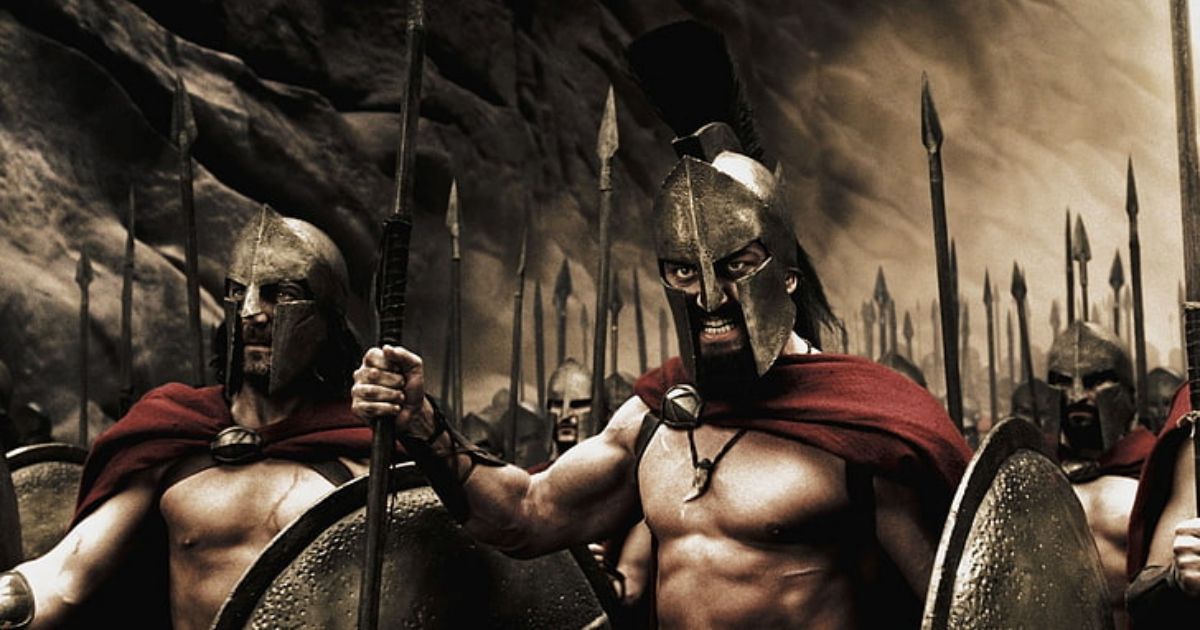Zack Snyder’s production of the graphic novel 300 by Frank Miller (who also helped produce the film) was a massive hit, grossing $456 million on a $60 million budget and tapping into a burgeoning generation of comic book fans (and angry boys and men) two years before the MCU. At the time (2006), many people loved the film, with audiences adoring its blood-soaked action and critics like Sight and Sound calling it, "an evolution in 'virtual' cinema."
With 15 years of hindsight and political turmoil, many people now see 300 as both a cheesy, unintentionally funny, homoerotic mess, and a blatant piece of right-wing nationalist propaganda that glorifies death, xenophobia, and race wars. As such, it has been embraced by the “alt-right” movement of white nationalists all over the globe but most prominently in America.
In the film, a group of 300 Spartans decides to take on the Persian army that numbers over 300,000 men. They fight nobly but of course are all massacred at the end, as they are embarrassingly outnumbered in the film; their ironically jihadist fight against what is now Iran and Asia is an epic act of stupidity that somehow continues to inspire questionable people.
The Eugenics and Race War of 300
300 does not hide its ideology. The film begins with a pile of dead babies. The Spartans embrace eugenics and infanticide, and the dead babies are ones not deemed fit to grow up to be bloodthirsty warriors because of their physical defects (one of the many reasons why Nazis loved the Spartans). Other than the queen and a few servants, everyone in the film is male, which implies they are probably killing off the female infants as well as the unfit males. The few females are sex objects to be manipulated. This is not exactly the type of society you would want to violently glorify, to kill and die for. There is no talk of negotiating with the enemy; they exist merely to be murdered. In fact there is no talk of much besides the glory of battle and dying heroically, and the camaraderie of mass murder.
This is a fantasy world filled with monsters and eternal warfare. As one character puts it, death on the battlefield in service of Sparta is the greatest achievement one can make in this lifetime. In other words, people are not judged so much by their actions and qualities but by their willingness to blindly die for the state and for white imperialism; the Persians they fight are notably BIPOC in comparison to the very white Spartans, who, historically, were actually dark-skinned Mediterranean Dorians and not pale-skinned and blue-eyed).
As historian Spencer McDaniel writes for Tales of Time Forgotten (which exhaustively and brilliantly breaks down all the historical inaccuracies in the movie):
The reason why all the Persian characters in the film are portrayed as having much darker skin than all the Greek characters is not because this portrayal has any basis in reality, but rather because the filmmakers are trying to send an explicit racist message. The film is overtly trying to portray the Greco-Persian Wars as a racial conflict and trying to exalt the Spartans as heroes for supposedly keeping people who are not white from entering Europe.
In addition to this, 300 also contains strongly implied anti-Semitism, and it glosses over the rampant pedophilia of Spartan society, where women were inferior in every way, including as sex partners. The king’s wife is the one exception, being a strong-willed individual. She is the lone woman in the film worthy of being mentioned.
300 Equates Masculinity With Loud, Strong Rage
For the Spartans, a death on the battlefield, no matter how inconsequential, is considered a beautiful death in this jingoist militarist propaganda piece, where exterminating all of Asia and “Asia’s endless hordes” is the goal. And since Persia is now Iran, the enemies who are slaughtered are presumably of Arab descent (Iran was predictably bothered by the film, with one headline reading, "Hollywood declares war on Iranians"). In this sense, the film presents tacit support for the contemporaneous wars in Iraq and Afghanistan (the queen even literally says "Freedom isn't free" at one point). The original author of 300, Frank Miller, seems completely echoed here — Miller has been condemned for his depiction of and statements against Arabs and Islam, having even written a comic titled Holy Terror in which a superhero tortures and kills Muslims.
This testosterone-fueled film features only the strongest of men, all featuring bulging six-packs and massive muscles. This is what it takes to be a true man to them — not intelligence or wisdom, humor or compassion, but sheer strength. This partially explains the enthusiastic decision to lead 300 men into certain death by taking on an army that numbers in the hundreds of thousands. In the film, each Spartan would have to kill 1,000 enemy soldiers to have a shot (in reality, roughly 5,000 Greek soldiers joined the 300 Spartans).
The film is not just insanity, it is an organized suicide, with the Spartans run by King Leonidas (Gerard Butler), who seems literally disturbed and psychotic with his bloodlust and his manic dialogue, all shouted at the loudest possible volume (the equivalent of writing in all capital letters to make a point), as if loudness and fury trump reason and common sense. The king is completely insane, a monomaniacal nationalist obsessed with slaughtering and beheading others on the battlefield, causing as much genocidal carnage as he can, and enthusiastically urging his followers to do the same.
Conformity and Propaganda in 300
The other soldiers lack distinct identities. Each is there to show off his muscles and exterminate as many dark-skinned foreigners as possible. They all die 'gloriously,' proud to sacrifice their lives for the Spartan cause in what seems like an honest advertisement for the U.S. military. They make belligerent speeches, and they scream about loyalty and duty. King Leonidas, as their leader, is at least somewhat different from his army, who are just about of clones, a group of reverse Stepford Wives who are so conformist they might as well be machines. Conformity seems to be the one trait almost important as racist Alpha Male bloodlust. There are no debates or even discussions about the ultimate purpose and (lack of) wisdom of their suicidal rampage.
These are all hallmarks of a propaganda film, when the characters lack personalities in favor of blind and unthinking loyalty to a highly questionable cause. They lack a basic humanity and merely exist as fodder for xenophobic violence. From the way they fight in tight and coordinated formation, it is clear they all think the same as well. A casual look at the film might make them seem heroic, but they are just brainwashed and bloodthirsty, wanting nothing more than to die in a blaze of glory, taking out as many foreigners as possible along the way.
Dominic West (The Wire) plays the only interesting character in the film. Unlike the rest of the lot, he is a politician and a sleazy, treacherous liar who casts aspersions on the queen, who, big surprise, stabs him to death, as obsessed with maintaining political control as her husband is obsessed with military control and battlefield massacre.
The Bland Violence of 300
For all the violence in the film, nothing stands out as exceptional. The blood and impalements are all CGI generated, and every death looks exactly the same. At least in a propaganda film like Rambo III, there are some interesting and exciting and original deaths. In 300, the stabbings and beheadings actually come across as boring because they are unrealistic and repetitive, and we never see an enemy soldier suffering in agony.
If filmmakers are going to create an ultra-violent film, it's necessary to show a little pain and agony, but these characters are so hollow that they can't even suffer (the completely unrealistic soporific CGI effects don't help). Everyone’s death in 300 is a glorious sacrifice to a higher cause, and everyone dies happy or with beauty. There is no regret or even redemption. These soldiers are not human beings; they are cogs in a suicidal murder machine. Fans of cinematic violence will quickly find themselves bored.
300 and the Alt-Right
The problem is not that 300 is just a terrible film and a piece of cinematic propaganda. Part of the problem is that "300 presaged the howling fascism of the alt-right," as Tom Breihan writes for The AV Club. Extreme fringe political groups that advocate white nationalism and a global uprising of white Christians defeating the world have made 300 into a cult item, using it to justify the worst elements of humanity such as genocide, racism, repression, conformity, imperialism, and violence as a solution to any problems.
Some disturbed viewers get a sadistic and hateful pleasure in the film as it prepares them for violence. This is the type of film you show to soldiers who are headed out to death and misery in an upcoming war, to excite them about killing and help them forget that they might be sacrificing their lives for a meaningless, endless war machine (a violent meaninglessness highlighted by the awful conclusions of America's last major wars, Vietnam, Iraq, and Aghanistan). That this is considered inspirational entertainment (to the extent that there's a word for people who idolize Spartans and 300, 'Laconophilia') is both absurd and terrifying.
Sparta’s most famous advocate was Adolf Hitler ("The Spartans were once capable of such a wise measure," Hitler said, "The subjugation of 350,000 Helots by 6,000 Spartans was only possible because of the racial superiority of the Spartans"). He had his Nazi youth, where young men were trained to be cold-hearted killers with no personalities and a lot of battlefield practice. This is directly based on Spartan society, when children were taken from their homes at age seven and forced to train in military tactics, even killing people from different cultures. In one of the film’s more humorous moments, a young child is sent out to prove himself by killing an insanely fake-looking CGI bear. Of course, the young child warrior easily slays the beast and becomes a hero.
The Alt-Right's Molon Labe
Like 'the red pill' in The Matrix, the alt-right has co-opted the phrase "come and get them" (molon labe in classical Greek) above arguably anything else in 300. The Washington Post writes about this (which is echoed and discussed by Resetera):
You can get a taste of the phenomenon through a search on Twitter or Google for the phrase “Molon Labe": translated roughly as “come and take it," the laconic response Leonidas is said to have given to an envoy of the Persian emperor who demanded the Spartans lay down their arms.
Since the popularization of the "300" story, “Molon Labe" became a kind of code word for gun-rights supporters in the United States, as well as the tea party movement, a catchall slogan for those irked by the invasive power of the federal government and the supposed leftist aim to take away their weapons. On social media, that messaging now co-exists with #maga — “Make America Great Again" -- and other online slang used by Trump supporters.
In short, the film is about a small but strong ethnic tribe that is thirsty for the blood of those who are different from them, and who go to war at the slightest provocation, with the goal being a complete genocide of the foreign enemies and their ways of life. The idea of family is non-existent when young boys are stolen from their homes to be trained as brutal bloodthirsty warriors who prance around almost completely nude (even when it snows), exterminating foreigners in bloody battles that are portrayed as cartoonish and absurd. All foreigners are portrayed as nasty subhuman enemies of the Spartan state, creating a paranoid society that was so disturbed that they routinely killed newborn babies.
There are many reasons why 300 is considered "awful," as The Guardian writes, calling it, "a movie they'd have loved in '30s Germany." It's bad, but not quite bad enough to be “so bad it's good” like an Ed Wood film such as Plan 9 From Outer Space. It is just boring and repetitive, and the dialogue would be funny if it were not portrayed so seriously and beloved so dearly by some of the most antagonistic, reactive, aggressive people in America. Maybe someday, someone will make 300 as a parody of the stupidity of alt-right racism, sexism, transphobia, xenophobia, and extreme militarism. Until then, perhaps 300 belongs in the past.


